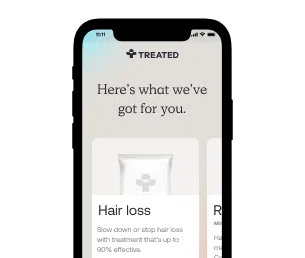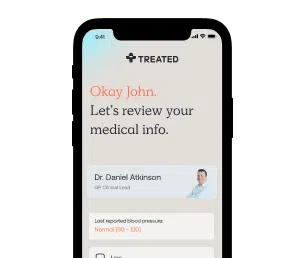Warts
Quick and effective treatment for warts.
Secure delivery
UK clinicians
Warts are small, rough lumps on the skin. They’re often skin coloured and bumpy, but they aren’t usually itchy or painful.
Chat with our expert clinicians and you’ll get treatment recommendations that suit you best. Order wart treatment online with us and get a tailored aftercare service.
Warts are small, rough lumps on the skin caused by a virus called the human papillomavirus (HPV). When the virus infects the skin, it can cause warts. Warts may appear anywhere on the body but they’re usually found on the fingers and hands. They vary in size and appearance. Warts are usually harmless. In some cases, they may be troublesome and painful, or cause embarrassment.
Warts can affect anyone, but they’re rare in babies and very young children. Many people develop warts at some time in their lives, usually before the age of 20. Warts spread through physical contact and contaminated surfaces. So you’re more likely to catch warts if you come into contact with someone else who has them, or through sharing spaces with many people like at gyms.
Warts are very common. A cross-sectional study of five European countries found that they were the most prevalent skin condition. Warts will affect 41.3% of the population at some point in their lifetime. They’re particularly common among school-aged children and adolescents, but anyone can get them.

How we source info.
When we present you with stats, data, opinion or a consensus, we’ll tell you where this came from. And we’ll only present data as clinically reliable if it’s come from a reputable source, such as a state or government-funded health body, a peer-reviewed medical journal, or a recognised analytics or data body. Read more in our editorial policy.
Although warts aren’t very contagious, you catch them when you come into contact with someone who has them. They also spread through contaminated surfaces. You may spread the warts from one area of your body to another if you scratch the affected area and then touch another part of your body.
To avoid spreading them, wash your hands or cover your warts with plasters. Try not to share towels or clothing. To prevent catching warts, wash your hands after touching a person who already has warts or after coming into contact with shared equipment and spaces. You may also be more likely to catch warts if you have a weak immune system, because it makes you more susceptible to the HPV virus.
The main symptom of warts is the fleshy growth on the skin. It may be slightly lighter or darker than your natural skin tone, and sometimes has small dark or black spots within the main growth. Warts range in size from about one millimetre to ten millimetres. You might develop a cluster of warts close together, or just one. Sometimes, warts come with symptoms like itchiness, pain, pressure or tightness in the surrounding skin.
Warts are usually harmless. But they can be embarrassing for some people or cause issues with appearance. The main things you have to worry about are spreading your warts to others, or catching a secondary skin infection. So that you don’t spread warts, try not to share towels or bedding with others. Wash your hands after touching your warts and try not to scratch the area. Scratching your warts can also put you at risk of infection. If you break or damage the skin of the wart, you risk introducing bacteria that can harm you.

How we source info.
When we present you with stats, data, opinion or a consensus, we’ll tell you where this came from. And we’ll only present data as clinically reliable if it’s come from a reputable source, such as a state or government-funded health body, a peer-reviewed medical journal, or a recognised analytics or data body. Read more in our editorial policy.
Warts are often treated with topical treatments containing salicylic acid. Various lotions, paints and special plasters are available that contain salicylic acid. The acid burns off the top layer of the wart. You shouldn’t use these to treat the warts on your face because the skin irritation could cause scarring.
After you start using the salicylic acid treatment, you’ll see some improvement in two weeks or more. You usually need to apply these treatments regularly for three months for the warts to go completely. If these don’t work, there are surgical and non-surgical intervention treatments for warts available.
The best treatment for warts is mainly down to personal choice. There are a few different formulations of treatments containing salicylic acid, so you can find the one that works best for you. Some people may decide they don’t want to treat their warts at all, as they often go away on their own.
If you choose to do this, make sure you don’t spread your warts to others by maintaining good hygiene and not sharing clothes, towels or bedding. Covering your warts with plasters may also help prevent you from spreading them. It’s really up to you what you do. If you have a compromised immune system, your warts will probably not go away on their own.

How we source info.
When we present you with stats, data, opinion or a consensus, we’ll tell you where this came from. And we’ll only present data as clinically reliable if it’s come from a reputable source, such as a state or government-funded health body, a peer-reviewed medical journal, or a recognised analytics or data body. Read more in our editorial policy.
Have something specific you want to know? Search our info below, or ask our experts a question if you can’t find what you’re looking for.
Prevalence of skin disease in a population-based sample of adults from five European countries. British Journal of Dermatology, 178(5), pp.1111–1118.

Registered with GMC (No. 4624794)
Meet Daniel
Registered with GPhC (No. 2202465)
Meet Sanjeda
Registered with GPhC (No. 2070724)
Meet Craig
Always read the leaflet that comes with your medication and tell us about any side effects you get.
We know health, but you know you.
Our experts tell you what’s safe, but you decide what’s best.
Answer a few questions and tell us about yourself. Get tailored advice from our clinicians so you can choose better.

Choose your treatment and how often you have it delivered.

We know things change. It’s the nature of life. We’ll check in regularly to make sure your treatment is still right for you.
Pause. Change. Skip. Start again. Any time you like.
Here are some other things we can help with.
Choose from our range of tablets and solutions. Get ongoing care and support from our experts.
Stop smoking treatments that can help you kick the habit forever, and reduce your risk of disease.
Tablets or injections. Tailored weight loss treatments combined with ongoing support from our experts.
We're making healthcare more about you. Sign up to our newsletter for personalised health articles that make a difference.
Disclaimer: The information provided on this page is not a substitute for professional medical advice, diagnosis, or treatment. If you have any questions or concerns about your health, please talk to a doctor.
We couldn't find what you're looking for.
Here's everything we treat. Or, if you're looking for something we don't have yet, you can suggest something.
If there’s a particular treatment or condition you’re looking for, tell us and we’ll look into it for you.
Submit your question here, or tell us if you’ve found an issue on our site.
We’ll get back to you very soon. We aim to respond to all queries in one working day.
You’re signed up to our newsletter. Keep an eye on your inbox for our latest update.
By clicking 'Subscribe now' you're agreeing to our Privacy Policy.
We’ve sent you an email asking you to confirm your email address.